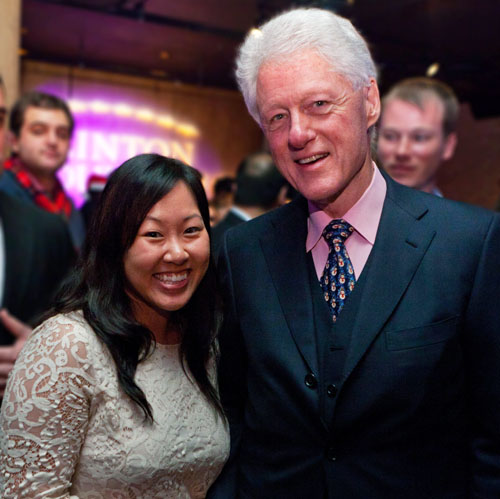
Stacey Yuen, B.Sc. ’03, says she wants to work herself out of a job, but that’s unlikely to happen anytime soon given the scope of her work with the Clinton Health Access Initiative (CHAI). Chaired by former U.S. president Bill Clinton, CHAI’s work began with HIV/AIDS projects in Africa. “Ideally, we’re going to work ourselves out of a job because countries won’t need our help anymore,” she says.
Yuen began interning at the organization while completing her MBA at ESADE Business School in Barcelona, Spain. After receiving the 2010 Clinton Foundation-ESADE Fellowship, she had the option of interning in a finance position or at CHAI. For Yuen, the choice was obvious: she chose to work with CHAI and was deployed to Haiti soon after the earthquake that struck in January 2010.
This was no ordinary internship: Yuen was trying to help rebuild a country that was already suffering long before the earthquake struck. First on her to-do list was to organize a conference for delegates from Haiti, Canada, the U.S. and France to revamp Haiti’s medical school curriculum. Doctors and nurses needed specialized training to deal with the country’s new medical reality: the earthquake had robbed people of their limbs, creating as many as 200,000 amputees.
“A lot of people who were trapped in buildings after the earthquake had to have emergency amputations,” says Yuen. The earthquake also left psychological scars. “With the emotional trauma of surviving a natural disaster of that magnitude, people needed help to talk through their feelings.”
She also confirmed financial commitments from donor countries and worked with construction companies and NGOs from around the world to help rebuild Haiti’s medical schools, three of which had been destroyed by the earthquake.
“It’s going to be a really long reconstruction process for the country, and I hope people will stay engaged there and continue to give to Haiti,” says Yuen. “I think it often becomes a case of ‘out of sight, out of mind.’ Some other natural disasters are always going to take the cover of the newspaper and people will divert their donations there. It would be a shame if efforts in Haiti slow down just because other natural disasters around the world happen.”
After completing her MBA, she was offered a position as a public health consultant in Central and West Africa. She joined CHAI’s team in Cameroon in July 2011 and has since worked in Benin, Burundi and Cote D’Ivoire. Her work involves national quantification projects to determine each country’s HIV/AIDS-related medical needs over the next five years. She also speaks with doctors and nurses to ensure they are using the best anti-retroviral therapies for their patients.
Yuen says developing countries need a hand up, not a hand out. “These problems are huge, and if you keep throwing money at them, it’s not going to solve them. It’s just going to be a band-aid solution and it will always be a temporary fix.”
Yuen’s parents instilled in her the importance of giving back at an early age. Her involvement in charitable causes began in high school, when she volunteered to walk dogs at the Humane Society (her parents wouldn’t let her get a dog of her own). “I wanted to be a veterinarian, so I wanted to get as much hands-on experience as I could.”
As an undergrad at U of G, she studied animal biology and zoology, but then switched to biological sciences, which gave her the option of taking a variety of electives. The finance courses she took with Prof. Francis Tapon proved to be invaluable to her future career path. She landed an internship at Burgundy Asset Management, led by Tony Arrell, B.Sc.(Agr.) ’67.
After graduation, Yuen was hired by Burgundy and worked there for almost seven years before doing her MBA. As a science graduate working in asset management, she says she felt like a fish out of water, but Arrell made her feel right at home. “We have that Guelph connection, which is the preliminary icebreaker,” says Yuen.
Beyond their alma mater, Yuen and Arrell also shared a dedication to philanthropy and they became involved in charitable causes ranging from the arts to education to development projects. “At Burgundy they were great,” she says. “They supported every cause I ever put on the table. Senior management and all the employees were very interested in seeing how they could do more from a philanthropic standpoint. Stuff can really happen when you have the support of everybody behind you.”